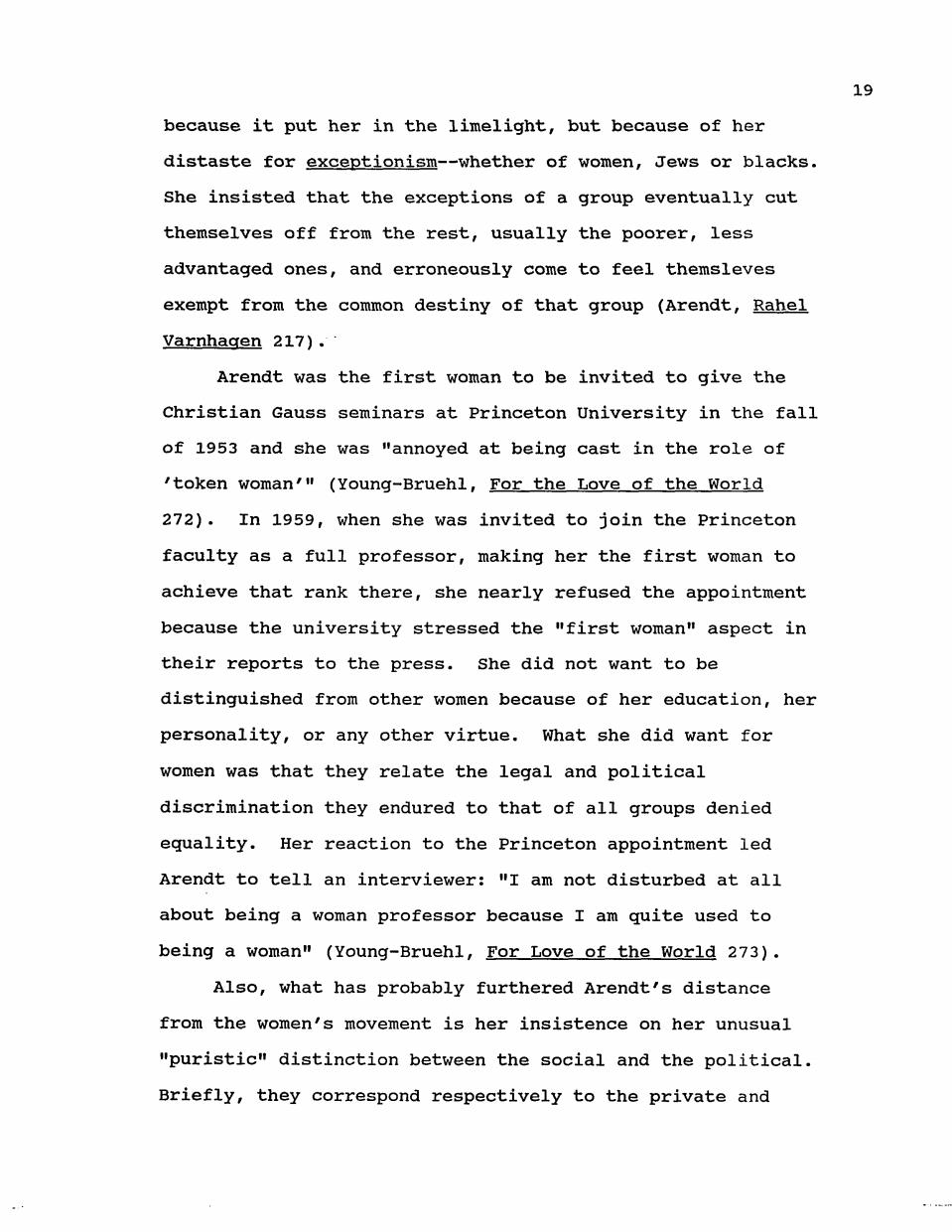
19 because it put her in the limelight,but because of her distaste for exceptionism--whether of women,Jews or blacks. she insisted that the exceptions of a group eventually cut themselves off from the rest,usually the poorer,less advantaged ones,and erroneously come to feel themsleves exempt from the common destiny of that group (Arendt,Rahel Varnhagen 217). Arendt was the first woman to be invited to give the Christian Gauss seminars at Princeton University in the fall of 1953 and she was "annoyed at being cast in the role of token woman"(Young-Bruehl,For the Love of the World 272).In 1959,when she was invited to join the Princeton faculty as a full professor,making her the first woman to achieve that rank there,she nearly refused the appointment because the university stressed the "first woman"aspect in their reports to the press.She did not want to be distinguished from other women because of her education,her personality,or any other virtue.What she did want for women was that they relate the legal and political discrimination they endured to that of all groups denied equality.Her reaction to the Princeton appointment led Arendt to tell an interviewer:"I am not disturbed at all about being a woman professor because I am quite used to being a woman"(Young-Bruehl,For Love of the World 273). Also,what has probably furthered Arendt's distance from the women's movement is her insistence on her unusual "puristic"distinction between the social and the political. Briefly,they correspond respectively to the private and
because it put her in the limelight, but because of her distaste for exceptionism—whether of women, Jews or blacks. She insisted that the exceptions of a group eventually cut themselves off from the rest, usually the poorer, less advantaged ones, and erroneously come to feel themsleves exempt from the common destiny of that group (Arendt, Rahel Varnhaaen 217). Arendt was the first woman to be invited to give the Christian Gauss seminars at Princeton University in the fall of 1953 and she was "annoyed at being cast in the role of 'token woman'" (Young-Bruehl, For the Love of the World 272). In 1959, when she was invited to join the Princeton faculty as a full professor, making her the first woman to achieve that rank there, she nearly refused the appointment because the university stressed the "first woman" aspect in their reports to the press. She did not want to be distinguished from other women because of her education, her personality, or any other virtue. What she did want for women was that they relate the legal and political discrimination they endured to that of all groups denied equality. Her reaction to the Princeton appointment led Arendt to tell an interviewer: "I am not disturbed at all about being a woman professor because I am quite used to being a woman" (Young-Bruehl, For Love of the World 273). Also, what has probably furthered Arendt's distance from the women's movement is her insistence on her unusual "puristic" distinction between the social and the political. Briefly, they correspond respectively to the private and
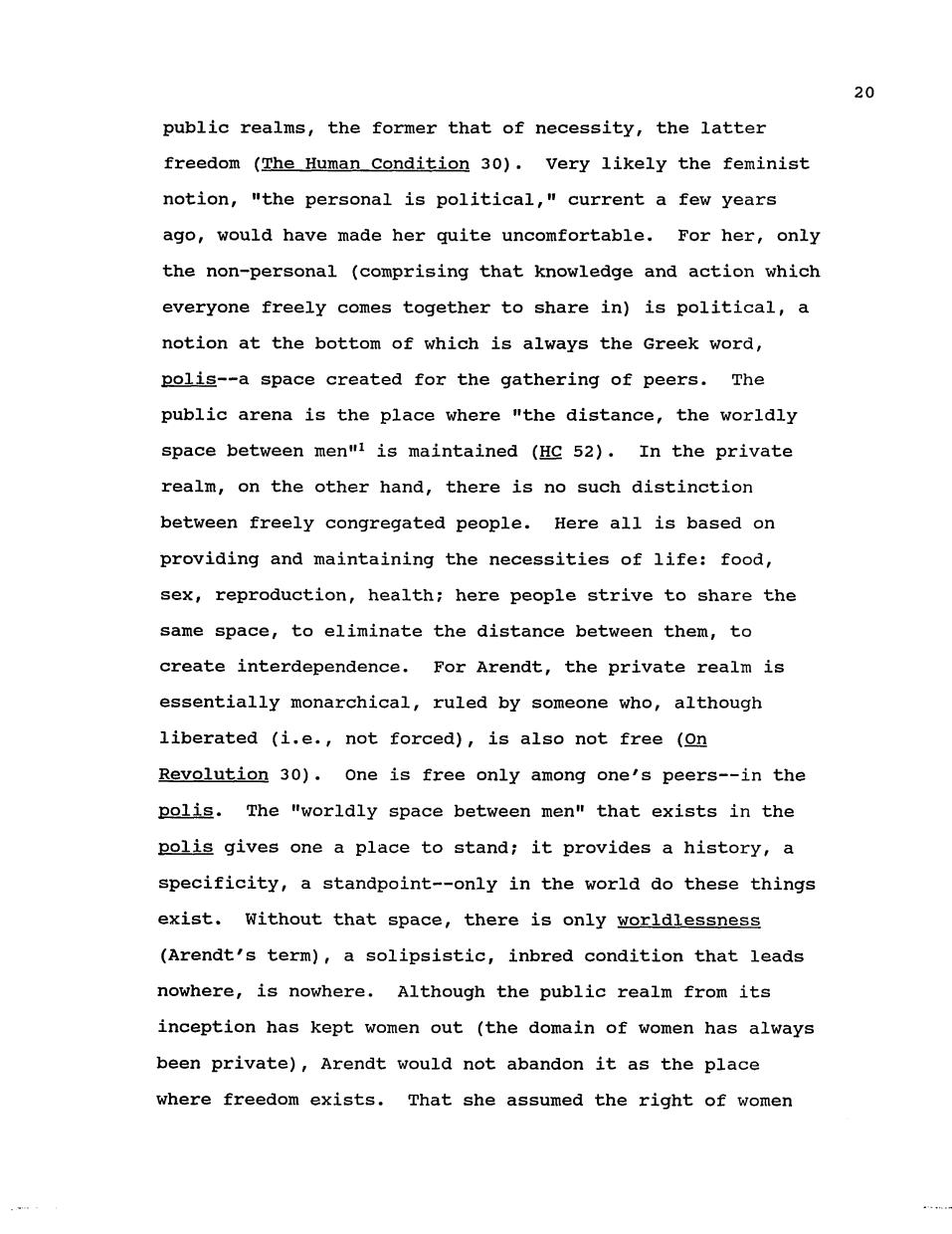
20 public realms,the former that of necessity,the latter freedom (The Human Condition 30).Very likely the feminist notion,"the personal is political,"current a few years ago,would have made her quite uncomfortable.For her,only the non-personal (comprising that knowledge and action which everyone freely comes together to share in)is political,a notion at the bottom of which is always the Greek word, polis--a space created for the gathering of peers.The public arena is the place where "the distance,the worldly space between men"1 is maintained (HC 52).In the private realm,on the other hand,there is no such distinction between freely congregated people.Here all is based on providing and maintaining the necessities of life:food, sex,reproduction,health;here people strive to share the same space,to eliminate the distance between them,to create interdependence.For Arendt,the private realm is essentially monarchical,ruled by someone who,although liberated (i.e.,not forced),is also not free (on Revolution 30).one is free only among one's peers--in the polis.The "worldly space between men"that exists in the polis gives one a place to stand;it provides a history,a specificity,a standpoint--only in the world do these things exist.Without that space,there is only worldlessness (Arendt's term),a solipsistic,inbred condition that leads nowhere,is nowhere.Although the public realm from its inception has kept women out (the domain of women has always been private),Arendt would not abandon it as the place where freedom exists.That she assumed the right of women
public realms, the former that of necessity, the latter freedom (The Human Condition 30). Very likely the feminist notion, "the personal is political," current a few years ago, would have made her quite uncomfortable. For her, only the non-personal (comprising that knowledge and action which everyone freely comes together to share in) is political, a notion at the bottom of which is always the Greek word, polis—a space created for the gathering of peers. The public arena is the place where "the distance, the worldly space between men"1 is maintained (HC 52) . In the private realm, on the other hand, there is no such distinction between freely congregated people. Here all is based on providing and maintaining the necessities of life: food, sex, reproduction, health; here people strive to share the same space, to eliminate the distance between them, to create interdependence. For Arendt, the private realm is essentially monarchical, ruled by someone who, although liberated (i.e., not forced), is also not free (On Revolution 30). One is free only among one's peers—in the polis. The "worldly space between men" that exists in the polis gives one a place to stand; it provides a history, a specificity, a standpoint—only in the world do these things exist. Without that space, there is only worldlessness (Arendt's term), a solipsistic, inbred condition that leads nowhere, is nowhere. Although the public realm from its inception has kept women out (the domain of women has always been private), Arendt would not abandon it as the place where freedom exists. That she assumed the right of women
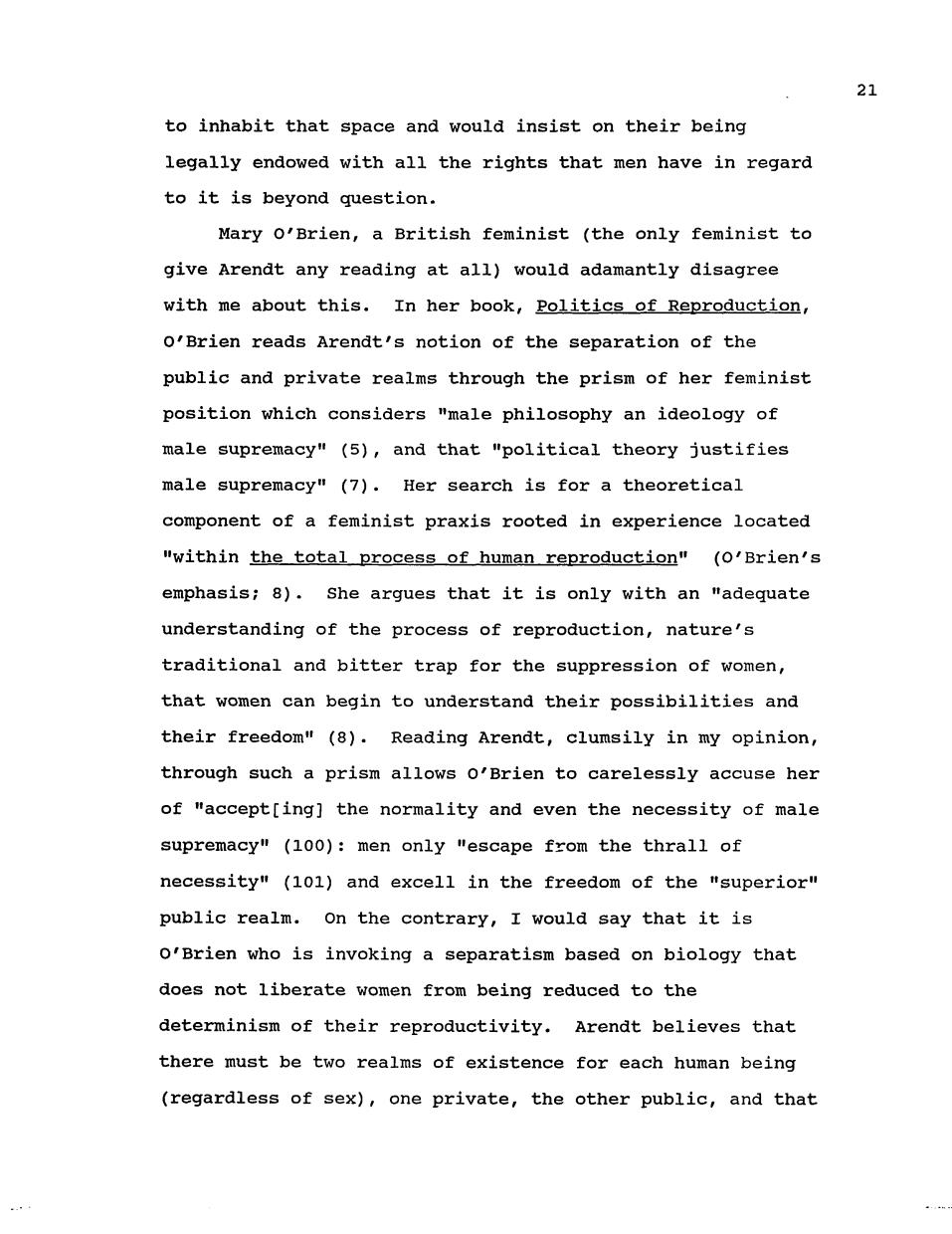
21 to inhabit that space and would insist on their being legally endowed with all the rights that men have in regard to it is beyond question. Mary o'Brien,a British feminist (the only feminist to give Arendt any reading at all)would adamantly disagree with me about this.In her book,Politics of Reproduction, o'Brien reads Arendt's notion of the separation of the public and private realms through the prism of her feminist position which considers "male philosophy an ideology of male supremacy"(5),and that "political theory justifies male supremacy"(7).Her search is for a theoretical component of a feminist praxis rooted in experience located "within the total process of human reproduction"(O'Brien's emphasis;8).She argues that it is only with an "adequate understanding of the process of reproduction,nature's traditional and bitter trap for the suppression of women, that women can begin to understand their possibilities and their freedom"(8).Reading Arendt,clumsily in my opinion, through such a prism allows o'Brien to carelessly accuse her of "accept[ing]the normality and even the necessity of male supremacy"(100):men only "escape from the thrall of necessity"(101)and excell in the freedom of the "superior" public realm.On the contrary,I would say that it is o'Brien who is invoking a separatism based on biology that does not liberate women from being reduced to the determinism of their reproductivity.Arendt believes that there must be two realms of existence for each human being (regardless of sex),one private,the other public,and that
to inhabit that space and would insist on their being legally endowed with all the rights that men have in regard to it is beyond question. Mary O'Brien, a British feminist (the only feminist to give Arendt any reading at all) would adamantly disagree with me about this. In her book, Politics of Reproduction. O'Brien reads Arendt's notion of the separation of the public and private realms through the prism of her feminist position which considers "male philosophy an ideology of male supremacy" (5), and that "political theory justifies male supremacy" (7). Her search is for a theoretical component of a feminist praxis rooted in experience located "within the total process of human reproduction" (O'Brien's emphasis; 8). She argues that it is only with an "adequate understanding of the process of reproduction, nature's traditional and bitter trap for the suppression of women, that women can begin to understand their possibilities and their freedom" (8). Reading Arendt, clumsily in my opinion, through such a prism allows O'Brien to carelessly accuse her of "accept[ing] the normality and even the necessity of male supremacy" (100): men only "escape from the thrall of necessity" (101) and excell in the freedom of the "superior" public realm. On the contrary, I would say that it is O'Brien who is invoking a separatism based on biology that does not liberate women from being reduced to the determinism of their reproductivity. Arendt believes that there must be two realms of existence for each human being (regardless of sex), one private, the other public, and that
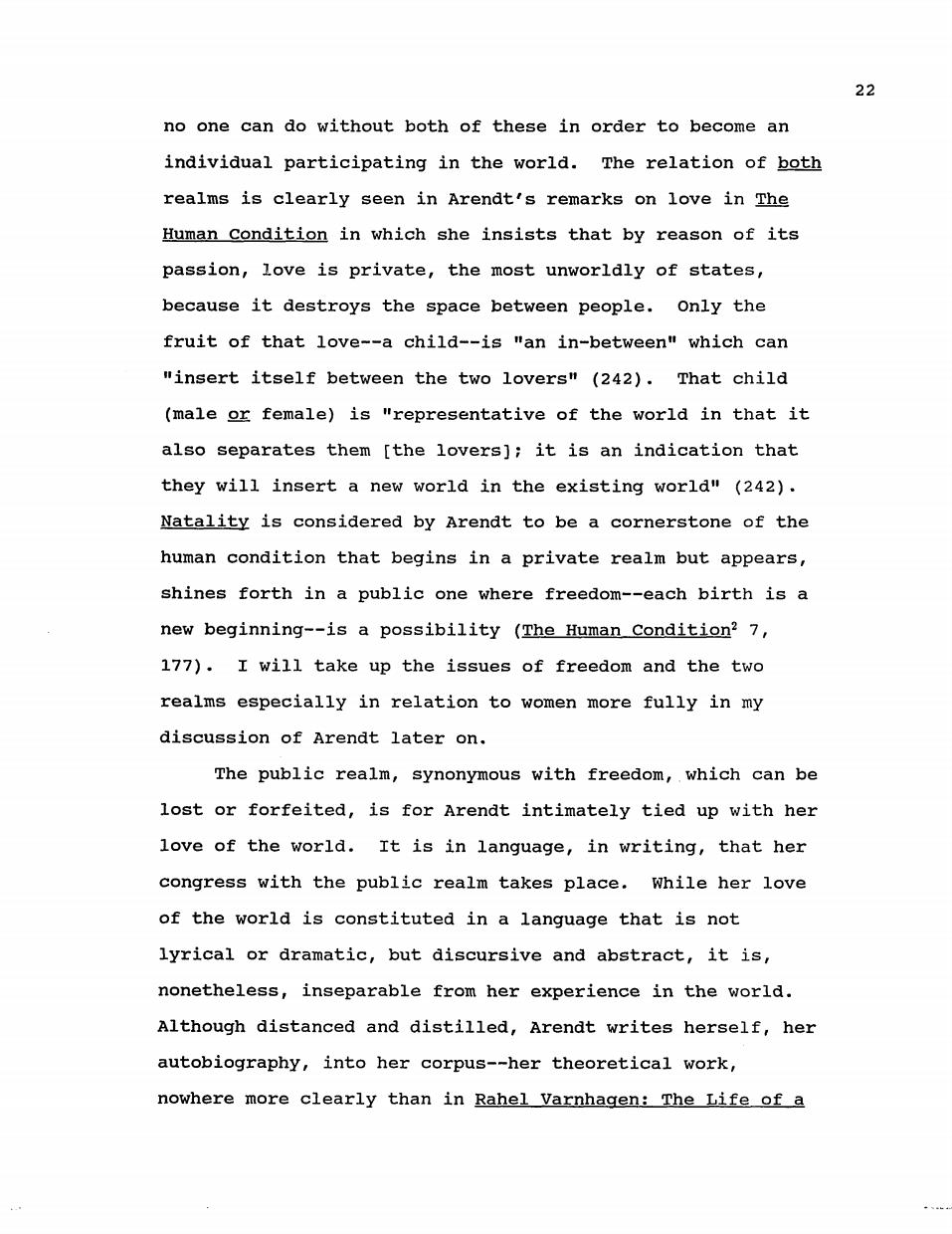
22 no one can do without both of these in order to become an individual participating in the world.The relation of both realms is clearly seen in Arendt's remarks on love in The Human Condition in which she insists that by reason of its passion,love is private,the most unworldly of states, because it destroys the space between people.Only the fruit of that love--a child--is "an in-between"which can "insert itself between the two lovers"(242).That child (male or female)is "representative of the world in that it also separates them [the lovers];it is an indication that they will insert a new world in the existing world"(242). Natality is considered by Arendt to be a cornerstone of the human condition that begins in a private realm but appears, shines forth in a public one where freedom--each birth is a new beginning--is a possibility (The Human Condition2 7, 177).I will take up the issues of freedom and the two realms especially in relation to women more fully in my discussion of Arendt later on. The public realm,synonymous with freedom,which can be lost or forfeited,is for Arendt intimately tied up with her love of the world.It is in language,in writing,that her congress with the public realm takes place.While her love of the world is constituted in a language that is not lyrical or dramatic,but discursive and abstract,it is, nonetheless,inseparable from her experience in the world. Although distanced and distilled,Arendt writes herself,her autobiography,into her corpus--her theoretical work, nowhere more clearly than in Rahel Varnhagen:The Life of a
no one can do without both of these in order to become an individual participating in the world. The relation of both realms is clearly seen in Arendt's remarks on love in The Human Condition in which she insists that by reason of its passion, love is private, the most unworldly of states, because it destroys the space between people. Only the fruit of that love—a child—is "an in-between" which can "insert itself between the two lovers" (242) . That child (male or female) is "representative of the world in that it also separates them [the lovers]; it is an indication that they will insert a new world in the existing world" (242) . Natality is considered by Arendt to be a cornerstone of the human condition that begins in a private realm but appears, shines forth in a public one where freedom—each birth is a new beginning—is a possibility (The Human Condition2 7, 177). I will take up the issues of freedom and the two realms especially in relation to women more fully in my discussion of Arendt later on. The public realm, synonymous with freedom, which can be lost or forfeited, is for Arendt intimately tied up with her love of the world. It is in language, in writing, that her congress with the public realm takes place. While her love of the world is constituted in a language that is not lyrical or dramatic, but discursive and abstract, it is, nonetheless, inseparable from her experience in the world. Although distanced and distilled, Arendt writes herself, her autobiography, into her corpus—her theoretical work, nowhere more clearly than in Rahel Varnhagen; The Life of a
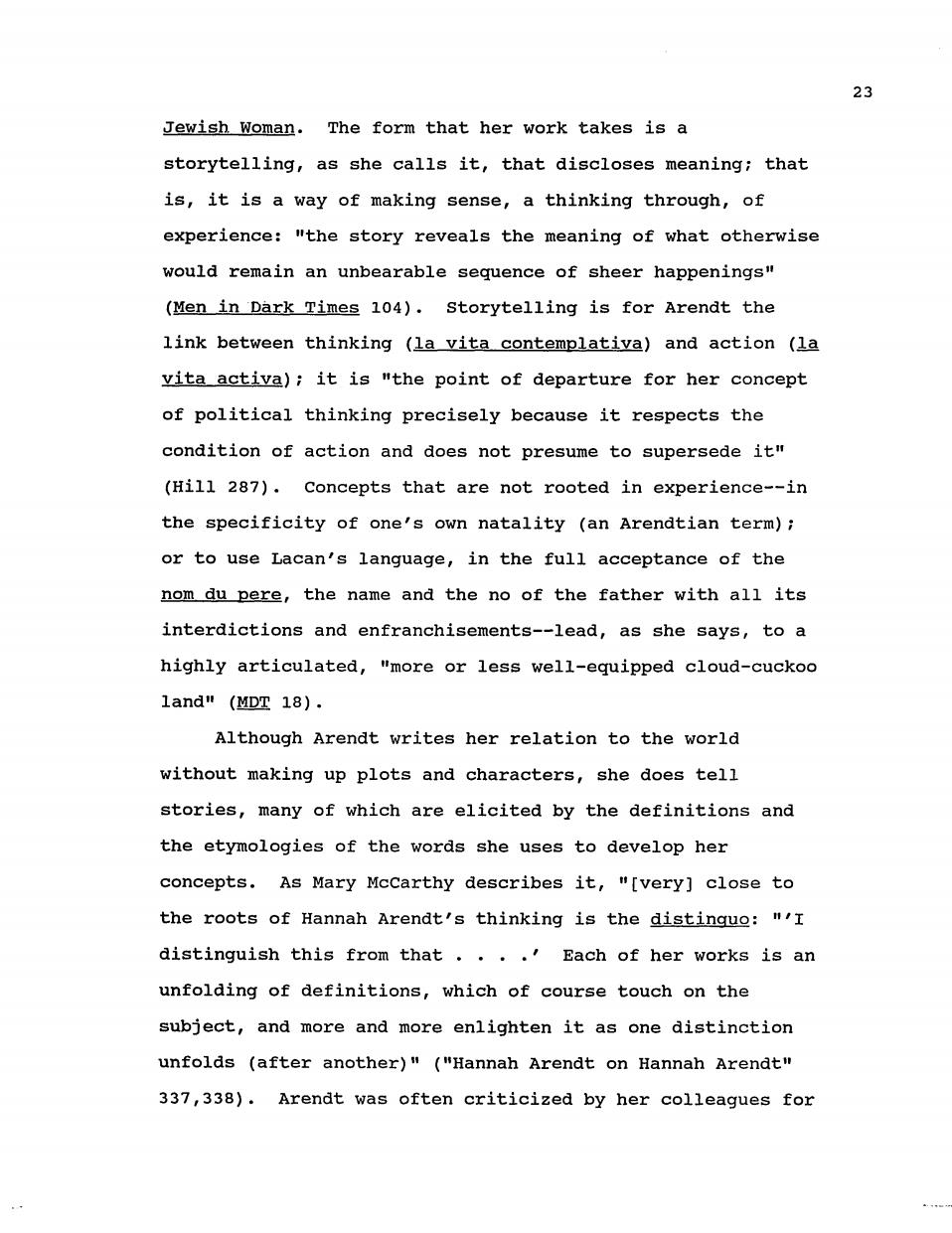
23 Jewish Woman.The form that her work takes is a storytelling,as she calls it,that discloses meaning;that is,it is a way of making sense,a thinking through,of experience:"the story reveals the meaning of what otherwise would remain an unbearable sequence of sheer happenings" (Men in Dark Times 104).Storytelling is for Arendt the link between thinking (la vita contemplativa)and action (la vita activa);it is "the point of departure for her concept of political thinking precisely because it respects the condition of action and does not presume to supersede it" (Hill 287).Concepts that are not rooted in experience--in the specificity of one's own natality (an Arendtian term); or to use Lacan's language,in the full acceptance of the nom du pere,the name and the no of the father with all its interdictions and enfranchisements--lead,as she says,to a highly articulated,"more or less well-equipped cloud-cuckoo land"(MDT 18). Although Arendt writes her relation to the world without making up plots and characters,she does tell stories,many of which are elicited by the definitions and the etymologies of the words she uses to develop her concepts.As Mary Mccarthy describes it,"[very]close to the roots of Hannah Arendt's thinking is the distinquo:"I distinguish this from that ...Each of her works is an unfolding of definitions,which of course touch on the subject,and more and more enlighten it as one distinction unfolds (after another)"("Hannah Arendt on Hannah Arendt" 337,338).Arendt was often criticized by her colleagues for
Jewish Woman. The form that her work takes is a storytelling, as she calls it, that discloses meaning; that is, it is a way of making sense, a thinking through, of experience: "the story reveals the meaning of what otherwise would remain an unbearable sequence of sheer happenings" (Men in Dark Times 104). Storytelling is for Arendt the link between thinking (la vita contemplativa) and action (la vita actival; it is "the point of departure for her concept of political thinking precisely because it respects the condition of action and does not presume to supersede it" (Hill 287). Concepts that are not rooted in experience—in the specificity of one's own natality (an Arendtian term); or to use Lacan's language, in the full acceptance of the nom du pere. the name and the no of the father with all its interdictions and enfranchisements—lead, as she says, to a highly articulated, "more or less well-equipped cloud-cuckoo land" (MPT 18). Although Arendt writes her relation to the world without making up plots and characters, she does tell stories, many of which are elicited by the definitions and the etymologies of the words she uses to develop her concepts. As Mary McCarthy describes it, "[very] close to the roots of Hannah Arendt's thinking is the distinguo: n / I distinguish this from that . . . .' Each of her works is an unfolding of definitions, which of course touch on the subject, and more and more enlighten it as one distinction unfolds (after another)11 ("Hannah Arendt on Hannah Arendt" 337,338). Arendt was often criticized by her colleagues for